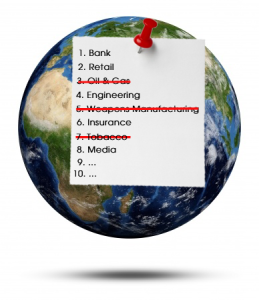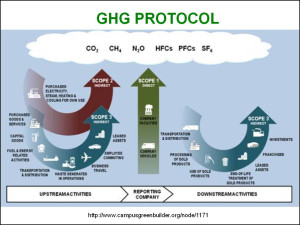3 Reasons to Screen Energy Companies from Rankings

Did you notice anything strange about the latest Global 100 rankings and the Climate Counts rankings? The January 2014 Global 100 ranking of the world’s 100 most sustainable large publically traded companies included ten oil and gas companies. The December 2013 Climate Counts rankings of corporations with the most sustainable carbon emissions included five oil and gas companies. What the …?! There are 3 reasons that inclusion of oil and gas companies in these rankings doesn’t pass the gut check.
1. Oil and gas companies’ products harm / kill people
Corporate Knights is wonderfully transparent about its Global 100 methodology. It begins with all publicly traded companies with a market capitalization of at least $2 billion, and subjects them to four screens. The third one is a negative screen that removes weapons manufacturing companies and tobacco companies from consideration. Why? Because their products knowingly directly or indirectly harm or kill people. It makes sense that tobacco and weapons companies should not make the cut when looking for the most sustainable companies in the world.
But don’t oil and gas companies produce fossil fuels which cause climate destabilization, which causes severe weather events, which harm or kill people? Climate destabilization is ranked by the World Economic Forum as one of the Top 5 most likely and impactful sustainability risks to countries and companies. Including oil and gas companies in the list of the most sustainable companies is more than an oxymoron—it is a travesty. Rankings should divest themselves of fossil fuel companies. They should be negatively-screened out of consideration.
2. Their Scope 3 emissions are not counted
The Greenhouse Gas (GHG) Protocol categorizes carbon emissions into three broad categories: Scope 1 emissions are all direct GHG emissions from the company’s operations; Scope 2 are indirect GHG emissions from consumption of purchased electricity, heat or steam; Scope 3 are indirect emissions in the company’s upstream and downstream value chain, including emissions generated when their products are used.
At least 80% of oil and gas company emissions are Scope 3 upstream and downstream emissions. That’s a big omission.
Why do Global 100 and Climate Counts methodologies not include Scope 3 emissions? Because publically traded companies do not have to be open and transparent with that data. Oil and gas companies not only keep their Scope 3 emissions secret; they don’t even acknowledge their accountability for them in their annual sustainability reports..
Scope 3 emissions are usually larger than Scope 1 and 2 emissions combined. Companies that do not disclose them should be scored zero on their carbon emissions performance. To do otherwise rewards non-disclosure, gives oil and gas companies a huge escape hatch on carbon emissions, and enables them to receive a very questionable sustainability halo.
3. Ranking methodologies are flawed
The Climate Counts methodology uses contribution to GDP in its carbon intensity calculation. GPD is a convenient metric and one for which data is wonderfully available, but it is a fatally flawed measure of progress. Nature doesn’t care whether a company’s GHG emissions look good relative to its contribution to GDP; it cares about the company’s absolute emissions that are destabilizing the climate. Nature would not agree that any oil and gas company has “sustainable” GHG emissions. The methodology is flawed.
The Global 100 methodology rates companies on their carbon productivity. This metric divides a company’s total revenue by its total GHG emissions, so if a company has very large revenues, it has high “carbon productivity.” Oil and gas companies like Exxon Mobil, Chevron, and Phillips 66 are in the top five on the Fortune 500 list of companies by revenue. Their carbon productivity ratio benefits from their huge revenue streams. Nature doesn’t care if the company is making a lot of money while it destabilizes the climate; it cares if it has high absolute GHG emissions. A sustainability ranking methodology that celebrates companies that are doing well while they trash the planet is flawed.
In November 2013, The Guardian published this article: “Just 90 companies caused two-thirds of man-made global warming emissions.” Most of the fifteen oil and companies in the Global 100 and Climate Counts rankings are among the 90 companies that are most responsible for climate change since the industrial revolution. By definition, they are among the world’s most unsustainable companies. Any ranking of sustainable companies that includes oil and gas companies is jeopardizing its credibility.
Bob
(Note that the above slide will be included in my March update to subscribers to my master Sustainability Advantage Slide set)





Comments are closed.